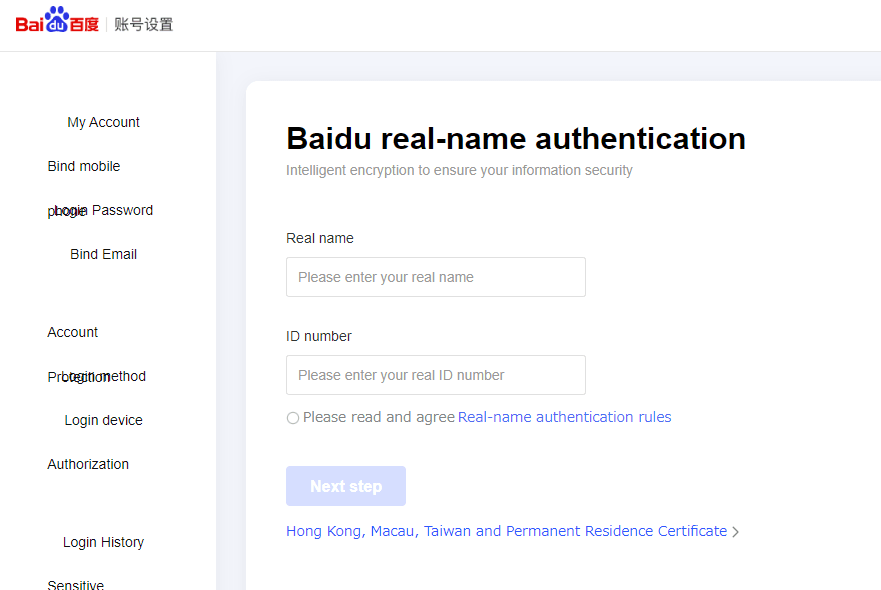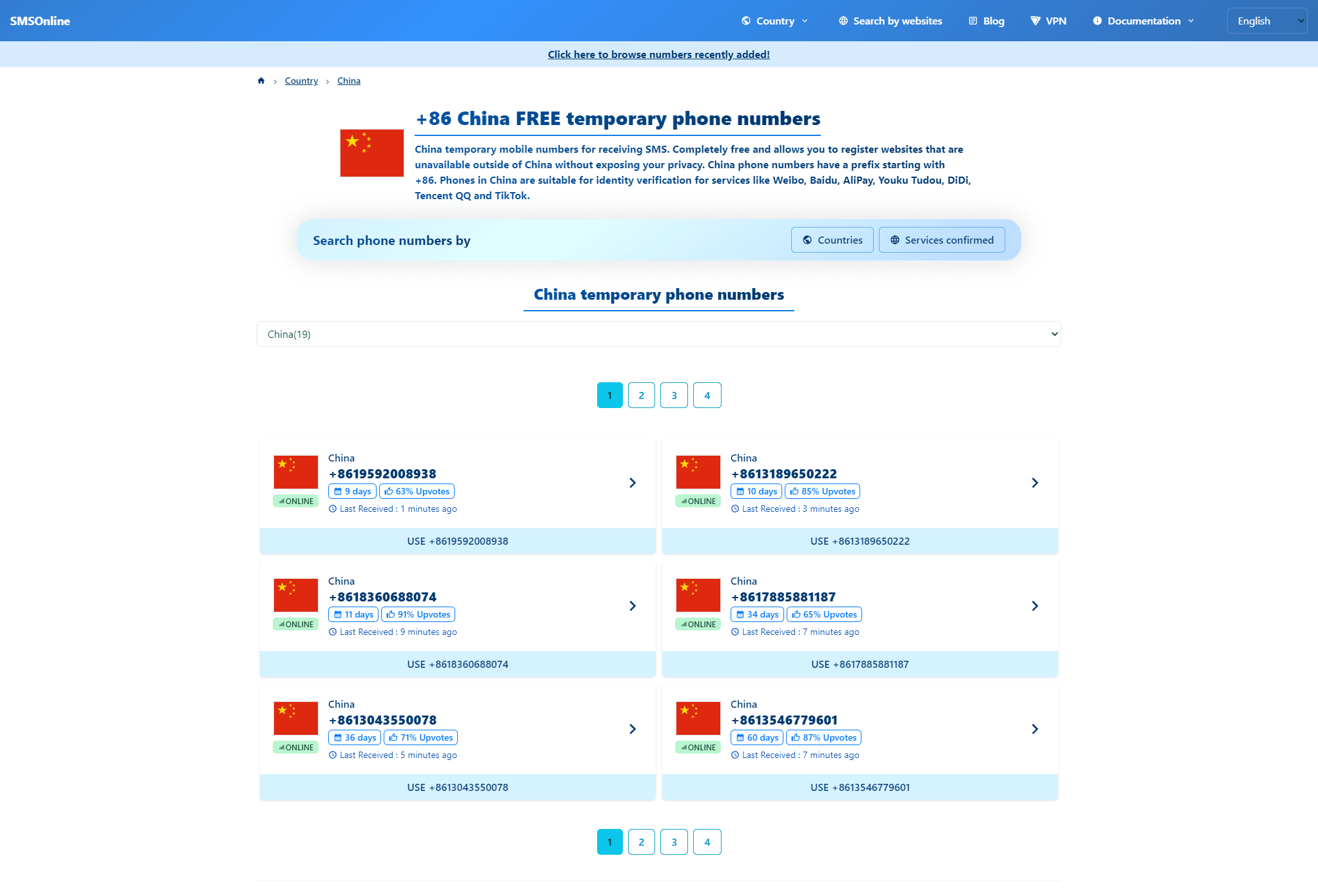
The Best Legit Tips for Bypassing Real Name Verification in China
Learn how to bypass China’s real-name authentication system from abroad while protecting your personal information. This guide covers methods, including those not requiring a passport, to safely navigate Chinese web services!
2024-08-160 minute readTips
Share
What is Real-Name Authentication in China?

In China, "real-name authentication" (实名认证) refers to a system that requires users to provide their real names and personal identification information when using internet services. This system aims to limit online anonymity and make it easier to manage and monitor online activities. Under this system, residents in mainland China use their Resident Identity Card (中华人民共和国居民身份证), while those in Hong Kong, Macau, and Taiwan use the Mainland Travel Permit for Hong Kong and Macao Residents (港澳台居民来往内地通行证) or the Taiwan Compatriot Permit (台湾居民来往大陆通行证) for identification.

Real-name authentication is applied across a wide range of internet services, including social media, online forums, e-commerce, payment systems, and gaming platforms. For example, when using popular Chinese social networks like WeChat and Weibo, users must register their phone numbers and ID numbers to complete identity verification, or they may be unable to register or access most features of the service.
This system was introduced by the Chinese government to manage online speech and behavior. As internet anonymity increased, so did the spread of misinformation, illegal activities, and critical comments about the government. To address these issues, the Chinese government officially implemented real-name authentication in October 2017. As a result, many web services targeting mainland China, including Baidu, Tencent, and NetEase, now require users to verify their real names and government-issued ID numbers before they can use the services.
However, real-name authentication is a system-level measure and does not mean that users' real names are visible on social media posts for everyone to see. Like most other countries, users can generally use pseudonyms on platforms. Nevertheless, the government can identify who made a post without restriction.
Naturally, this real-name authentication also affects foreigners. When visiting China for travel or business, foreigners are also required to undergo real-name authentication to use domestic web services. This may limit available services or complicate the verification process.
Thus, real-name authentication has deeply permeated Chinese internet use as a fundamental rule. Users must comply with this system to use services comfortably, making it virtually impossible to avoid the verification process. However, concerns about privacy protection and surveillance remain strong, and discussions about the system's future are likely to continue.
This article will explore the background of real-name authentication and discuss whether it is possible to bypass this system.
Examples of Situations Requiring Real-Name Authentication

In China, real-name authentication is required in many different situations.
Here are 20 examples of popular web services that foreigners also use:
- WeChat (微信) - China's largest messaging app.
- Weibo (微博) - Microblogging platform.
- QQ - Instant messaging and social networking service.
- Douyin (抖音) - Short video sharing platform (international version is TikTok).
- Kuaishou (快手) - Video sharing service.
- Momo (陌陌) - Dating app with social networking features.
- Zhihu (知乎) - Q&A platform (Chinese version of Quora).
- Bilibili (哔哩哔哩) - Video sharing platform popular for anime and gaming content.
- Xiaohongshu (小红书) - Lifestyle social network with shopping features.
- Tantan (探探) - Leading dating app in China.
- Taobao (淘宝) - China's largest online shopping platform.
- JD.com (京东) - Major e-commerce platform in China.
- Pinduoduo (拼多多) - Social shopping platform.
- Suning (苏宁) - Online shopping service for electronics and consumer goods.
- VIP.com (唯品会) - E-commerce site specializing in fashion and lifestyle products.
- Tmall (天猫) - Premium version of Taobao, focusing on branded goods.
- Meituan (美团) - Integrated service for food delivery and shopping.
- Ele.me (饿了么) - Food delivery service.
- Alipay (支付宝) - Mobile payment platform.
- WeChat Pay (微信支付) - Mobile payment feature within WeChat.
Most of these services require real-name authentication at registration or usage.
As real-name authentication has become mandatory for web service providers in China, its adoption is rapidly increasing.
So, are there ways to bypass real-name authentication on these websites or for foreigners without ID numbers? This will be explained in the next section.
Methods to Bypass Real-Name Authentication
Using a Passport for Authentication

Real-name authentication in China typically requires a Chinese ID card (身份证). However, for foreigners, it is also possible to use a passport for verification. Many web services and apps, including those from Netease and Alibaba Cloud, allow foreign users to register using passport information.
The process for passport-based authentication varies by service, but generally involves the following steps. First, create an account on the app or site and enter passport information when prompted for real-name authentication as a foreign user. Typically, you will need to provide passport number, name, nationality, and upload a photo or scan of the passport. Some services may also require facial recognition, so ensure that the passport photo matches your appearance.
However, there are some caveats to using a passport for authentication. First, some services may not fully accept passport-based verification, especially financial services or platforms operated by specific government agencies that do not accommodate foreign users. Consequently, the range of services available may be limited. Additionally, while standard real-name authentication is usually completed in seconds due to its digital nature, passport verification often requires manual review, which can take longer.
Using a passport for authentication is a smart solution and one of the effective ways for foreign users to access Chinese internet services, but it is not a complete solution and understanding its limitations is essential.
Using an Agency or Getting Help from a Chinese Friend for Registration Assistance
Another method for bypassing China's real-name authentication is to use an agency or seek the assistance of a Chinese friend for registration. This method is particularly useful for foreigners who do not have a Chinese ID or phone number.
Agencies are specialized service providers that offer real-name authentication services on behalf of clients. These agencies typically have the necessary information for real-name authentication within China and handle the registration process for their clients. Fees vary depending on the service, and it is important to choose a reliable agency. Using an agency can save time and make the process smoother.
Alternatively, you might ask a Chinese friend to help with registration. If you have friends or acquaintances living in China, you could request their assistance in using their ID or phone number for real-name authentication. This method can be cost-effective if you have a trusted relationship. However, using someone else's information involves privacy and responsibility issues, and you should be aware of the potential impact on your friend in case of any problems. It is crucial to discuss and share risks beforehand.
Thus, while using an agency or a friend's help can be effective for bypassing real-name authentication in China, both methods come with certain risks and should be considered carefully.
Using a Chinese Phone Number for Verification
The real-name authentication system in China commonly uses mobile phone numbers for verification. Receiving a confirmation code via SMS to activate an account is a widely used method. Obtaining a Chinese phone number is therefore a crucial means of bypassing real-name authentication.
Acquiring a Chinese Phone Number for Real-Name Verification
Chinese phone numbers can be purchased both domestically and internationally. In China, prepaid SIM cards for travelers and foreigners are available at airports and carrier stores. Alternatively, you can also acquire a Chinese phone number online from abroad. CUniq's online store offers relatively inexpensive eSIMs and physical SIM cards with Chinese phone numbers.
When purchasing a SIM card, identification such as a passport is usually required, so you should prepare your passport in advance.
Another method is using virtual phone number services. These services allow you to rent a Chinese phone number via the internet and use it for SMS reception. Many virtual phone number services are suitable for short-term use and can be easily contracted and used online.
Using SMSOnline for Real-Name Verification
SMSOnline provides over 20 Chinese phone numbers for free. These numbers are available to users worldwide and can be effectively used for phone number verification on Chinese websites.
No personal information is required to use these numbers, and you can start using them immediately. If you are concerned about exposing personal details such as a passport when registering on Chinese websites, SMSOnline offers a secure way to sign up without revealing your personal information.
Risks of Bypassing Real-Name Authentication
As mentioned, there are several methods to bypass real-name authentication on Chinese web services. However, bypassing real-name authentication comes with risks.
Firstly, there are legal risks. As previously mentioned, real-name authentication is legally mandated by the Chinese government for web service operators and users. Therefore, circumventing real-name authentication could be considered illegal. In areas with enhanced government scrutiny, such as social media and online payment systems, risks include account suspension or legal penalties.
Additionally, security risks may arise when bypassing methods are used. Providing personal information to agencies or third parties increases the risk of data leakage or misuse. Using untrusted services may lead to unauthorized use of personal information, so caution is essential.
Considering these risks, bypassing real-name authentication should be carefully evaluated.
With SMSOnline, there is no need to expose personal information, avoiding these risks while ensuring safe use. SMSOnline has been operating for over five years, backed by trust and experience.
Furthermore, SMSOnline implements a user rating system for phone numbers. This allows you to check if a phone number has been successfully used based on other users' reviews, providing an additional benefit.
Points to Note When Using Chinese Web Services
So far, we have discussed methods and risks related to real-name authentication on Chinese web services. Finally, here are some security and privacy considerations.
In China, real-name authentication is widely implemented, and government internet surveillance is intensified. Therefore, it is crucial to understand how personal information is handled and to take appropriate measures.
Firstly, it is important to be cautious when providing personal information. During the real-name authentication process, you may be asked for personal details such as name, address, phone number, and passport number. These details might be shared with both service providers and government agencies, so handle them with care. Provide only the minimum necessary information and avoid entering excessive personal details.
Additionally, be mindful of data handling. Many Chinese web services collect and analyze user data. Review the terms of service and privacy policies to understand what data is collected and how it is used. Avoid sharing unnecessary data by checking app permissions.
Lastly, be aware of censorship and content restrictions. In China, certain keywords and content are censored, and touching on these topics could lead to account limitations. Exercise caution in your online behavior and avoid sensitive subjects.
Considering these points will help you use Chinese web services safely. Maintain a high awareness of security and privacy to minimize risks.
